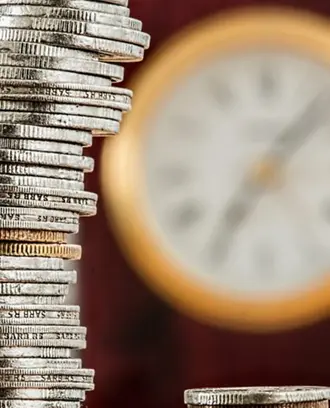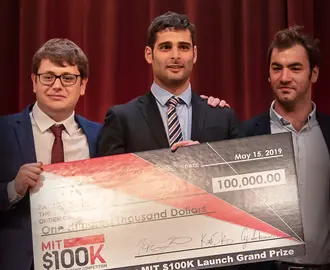World’s first automated restaurant, shipping route optimization among finalists’ offerings
Cambridge, MA, May 12, 2016––Astraeus Technologies, a startup that is creating a simple, noninvasive lung cancer screening test, took home the Robert P. Goldberg $100,000 grand prize Wednesday night after beating out seven teams of finalists during the MIT $100K Entrepreneurship Competition’s Launch Finale held on the MIT campus. A panel of judges made up of venture capitalists and industry professionals said they chose Astraeus Technologies based on the strength of their technology, business plan, pitch, and team composition.
According to the World Health Organization, lung cancer is the leading cause of cancer deaths worldwide. More than 9 million Americans were recommended for screening last year alone. Astraeus Technologies’ solution – the patent-pending L-CARD – is a simple gas sensor that will detect gases unique to the exhaled breath of patients with lung cancer. This noninvasive screening test, which can be read wirelessly by a smartphone, provides diagnostic information in seconds, can be produced for less than one dollar, and can be shipped anywhere in the world inside an envelope.
Astraeus Technologies is composed of four students who came together in November 2015:
Joseph Azzarelli: PhD, Chemistry, MIT
Alexander Blair: MD, Harvard Medical School
Graham Lierberman: MD, Harvard Medical School; MBA, Harvard Business School
Jay Kumar: MD, Harvard Medical School; MBA, Harvard Business School
The L-CARD is based on technology co-invented by Azzarelli in the laboratory of Timothy Swager, the John D. MacArthur Professor in the Department of Chemistry at MIT.
“In addition to interest from potential commercial partners, we have received tremendous feedback from our most important stakeholders: patients and providers,” says Azzarelli. “With the prize money from the MIT $100K, we will be able to conduct feasibility studies with patients starting this summer. Our goal is to first and foremost ensure efficacy and safety while bringing this product to market as soon as possible.”
Spyce, one of the seven runners up teams, won this year’s $5K Audience Choice Award. Spyce has developed the world’s first completely automated restaurant, cooking and serving meals with no human involvement. A Spyce Kitchen occupies only 20 square feet of space and can service locations such as office buildings or department buildings.
A $10K Thomson Reuters Data Prize was split between two teams, Hive Maritime and Swift Calcs. Swift Calcs offers a collaborative computational notebook. Hive Maritime, one of the seven runners up, is committed to saving the shipping industry billions of dollars by forecasting traffic in the world's ports and canals weeks in advance, which will optimize routes around congested choke points.
The $15K Creative Arts Prize went to Tekuma, a service that matches spaces—work, industry, home—with artists who create and curate art, which is then delivered to customers’ doors.
Booze Allen Hamilton also awarded a $10K prize to Revive Med, which offers a computational drug repurposing platform.
Besides Spyce and Hive Maritime, the remaining five finalists and their offerings are:
ABA Power has developed an aluminum based clean fuel with 30 times the energy density of lithium batteries, which requires no oxygen, produces no emissions, and reacts at low temperature.
AquaFresco has created a novel, close-loop water recycle technology that can cut water and detergent use in cleaning by 95%.
The DoneGood app and website makes it easy for users to find businesses and events that share their values.
Lux Labs are the creators of new nano-scale film that filters light selectively, creating better devices, reducing energy consumption, improving renewable energy capture, enhancing displays of electronic devices, regulating the brightness and temperature of buildings, and improving efficiency of LEDs and solar cells.
Solugen has created a bio-inspired and patented approach to creating hydrogen peroxide that is environmentally safer while dramatically cutting costs.
This year’s keynote speaker was Brian Matt, founder and chairman of Altitude, an innovation consultancy dedicated to creating breakthrough goods and services for its clients. Matt led the 1,000-plus audience in making paper airplanes from paper placed under their seats. Then he addressed why all the paper airplanes didn’t land on the stage: lack of time, no planning, lack of resources, and no one had formed teams. His take-away lesson? "You need to embed creativity in process," he said.
To date, the MIT $100K has facilitated the birth of more than 160 companies, which have gone on to raise $1.3 billion in venture capital and build $16 billion in market capitalization. More than 30 MIT $100K startups have been acquired by major companies, such as Oracle and Merck. Over 4,600 people are currently employed by MIT $100K companies. Recent IPOs include Akamai (AKAM), net.Genesis (NTG), and C-Bridge Internet Solutions (CBIS).
Since its debut in 1990 as the MIT $10K Entrepreneurship Competition, it has grown to include three independent contests – Pitch, Accelerate, and Launch – from September through May. Each contest focuses on developing specific founding skills. For each semi-finalist contender, the MIT $100K brings together a network of resources that includes mentorship from venture capitalists, serial entrepreneurs, corporate executives, and attorneys; media exposure; prototyping funds; business plan feedback; and discounted services. Altogether, more than $300K in non-dilutive prize money is awarded to help these new ventures accelerate.
For more on the MIT $100K, please visit: www.mit100k.org
Related Articles



